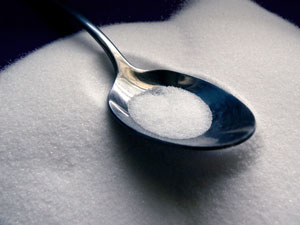 When low-fat diets were all the rage in the ’80s, many manufacturers turned to sugar and artificial sweeteners to put flavor back into products that previously contained fat. The artificial, non-nutritive sweeteners often won out as the calorie-free diet option. The trend had lead to a generation of super-sweet foodstuffs that stoke sugar cravings. The average artificial sweetener is 200 to 300 times sweeter than natural sugar, writes nutritionist and author Susan B. Dopart for The Huffington Post.
When low-fat diets were all the rage in the ’80s, many manufacturers turned to sugar and artificial sweeteners to put flavor back into products that previously contained fat. The artificial, non-nutritive sweeteners often won out as the calorie-free diet option. The trend had lead to a generation of super-sweet foodstuffs that stoke sugar cravings. The average artificial sweetener is 200 to 300 times sweeter than natural sugar, writes nutritionist and author Susan B. Dopart for The Huffington Post.
Little packets of artificial sweetener are an appealing way to cut down on calories. But what else are you giving up? Real sugar can trigger the body to feel full and satisfied. “When you are consuming alternative sweeteners, you are trying to fool your body. And guess what? It doesn’t work,” writes Dopart. “Your body knows what you are giving it is fake, so instead of being satisfied, it continues to send the signal that it wants to consume something sweet.”
In a study conducted at the University of Texas Health Science Center, it was found that people who drink diet soft drinks are even more likely to be overweight than those who drink regular, calorie-high soda. There was a 41 percent increase in risk of being overweight for every can or bottle of diet soft drink a person consumes each day.
How to quell your sweet tooth without overindulging in calories or sugar substitutes? Dopart suggests eating plenty of protein to make you feel full, avoid skipping meals, and switch from soda to water or flavored water. If you cut back on artificial sweeteners, natural sugars in fruit will start to taste sweeter and more delicious, and smaller amounts of natural sugar or honey will go further in your coffee and tea.
